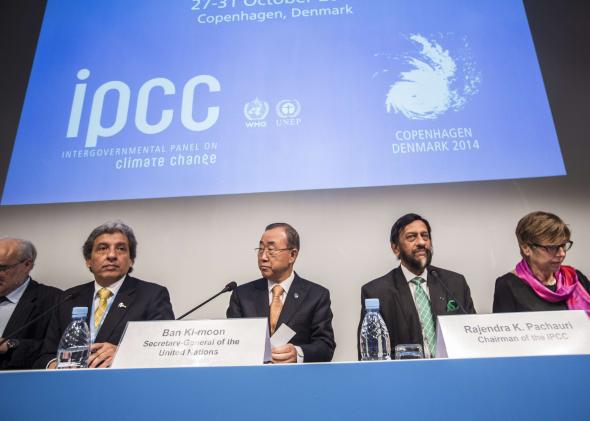The more things change, the more they stay the same. Scientists are in the news, warning about the dangers of escalating fossil fuel emissions:
- “Emissions resulting from human activities are substantially increasing.”
- “These increases will enhance the greenhouse effect, resulting on average in an additional warming of the Earth’s surface.”
- “Continued emissions of these gases at present rates would commit us to increased concentrations for centuries ahead.”
- “The longer emissions continue to increase at present day rates, the greater reductions would have to be for concentrations to stabilise at a given level.”
- “The long-lived gases [like carbon dioxide] would require immediate reductions in emissions from human activities of over 60% to stabilise their concentrations at today’s levels.”
Only thing is, the above statements were written in 1990.
Well, we all know what happened next: Greenhouse gases have continued to skyrocket (up 34 percent since 1990—above even the previous worst-case scenario), the Intergovernmental Panel on Climate Change’s projections of rising temperatures have been exceptionally accurate, “irreversible” change is underway, and still the world has responded with a collective “meh.”
On Sunday, the world’s best climate scientists were back at it, gathering in Copenhagen to deliver another report, the culmination of the most comprehensive study ever assembled on global warming. There’s no indication that this week’s report substantially changes the basics we knew back in 1990—though there have been huge advances over the past quarter-century in eliminating the remaining shreds of uncertainty in just how fast we’re screwing ourselves over.
Here’s a suggestion: no more climate change reports. Seriously, what else is left to say? Sure, the IPCC won a Nobel Peace Prize the last time one of these reports came out. It’s done its job remarkably well. So well, in fact, that there’s really no major scientific achievements left to be made on climate science. You heard that right: Sunday’s report should be the last one ever. (Besides, they’ve exhausted the scary-word thesaurus. The IPCC can’t ratchet up the language much more than “irreversible” and “unequivocal.”)
There is no lingering scientific uncertainty that should prevent an immediate “substantial and sustained” reduction in greenhouse gases by every country on Earth. Which countries reduce by what amounts should be our focus now, and that’s not a job for climate scientists. That’s a job for countries, communities, and individuals. Motivating action on climate change is a far trickier problem anyway, apparently, than understanding the inner-workings of humanity’s tampering with the Earth’s thermostat.
If I had a time machine and could interview the scientists who wrote the 1990 report and ask them where they thought we’d be by now, I’d guess that not a single one of them would have expected we’d have waited this long to address the problem. The warning signs, implications, and solutions were nearly as clear 24 years ago as they are today. Scientists are by and large rational people. They’d likely have assumed that, given such clear and convincing scientific evidence, surely our leaders would have taken action on something as important as the fate of a livable planet, right? Wrong.
Fast-forward to 2014. Despite polls showing a majority of swing-state voters are willing to support action on climate change, the issue is dead last in a ranking of topics that candidates are talking about in advance of Tuesday’s midterm elections.
Meanwhile, global warming keeps on keeping on. Denmark, like the rest of the planet, is mired in a particularly warm stretch (and by “particularly warm,” I mean never before experienced by humans in millennia, at least). As the scientists finalized the report’s wording, a team of artists assembled a temporary clock in the town square made of icebergs transferred from Greenland:
At this point, artists like these are at least as effective as scientists in motivating action on climate change. Just last month, as activists gathered by the hundreds of thousands in New York City to protest a U.N. summit on climate, a moving poem by a Marshall Islander was enough to bring world leaders to tears.
As I’ve written previously, it’s embracing our humanity, not relying on public interpretation of graphs of atmospheric gas concentrations, that will help us tackle climate change once and for all. Climate scientists are heroes, but it’s time for a new phase in this fight. The exasperation climate scientists feel on days like this is perhaps best summarized by Australian cartoonist Jon Kudelka:
The world’s best scientists have done the best they can. Now, the hard part begins: listening.
